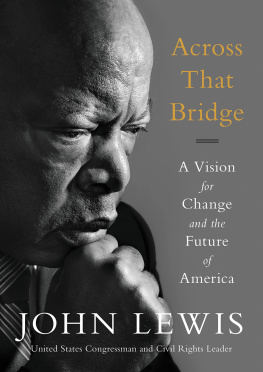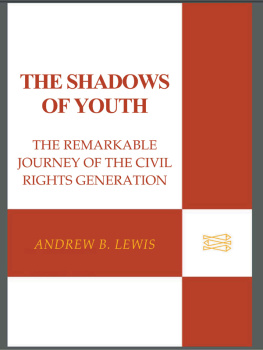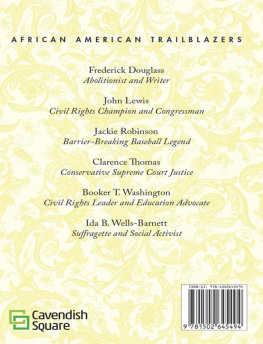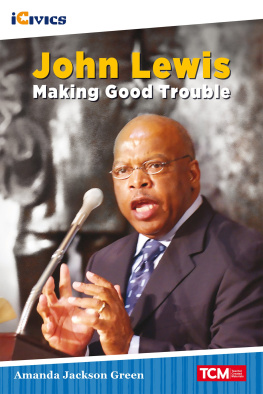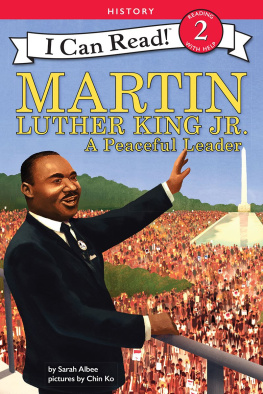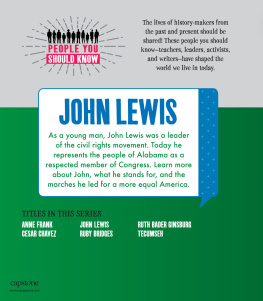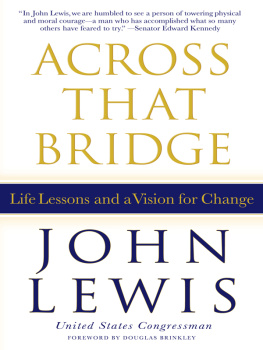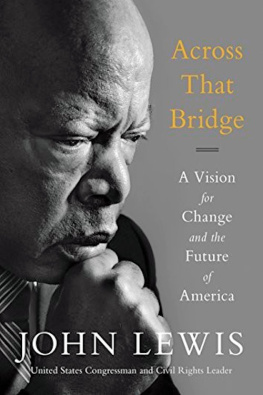Some men see things as they are and say Why? I dream
things that never were and say Why not?
R OBERT F. K ENNEDY
I have written these lessons on freedom and meditations on change for the generations who will take us into the future, for the dreamers young and ever young who should never get lost in a sea of despair, but are faithfully readying themselves for the next push for change. It is for the parents who want to inspire their sons and daughters to build a more just society. And, its for the sons and daughters who hear the call of a new age.
This book is for the people. It is for the grassroots leaders who will emerge not for the sake of fame or fortune, but with a burning desire to do good. It is for all those willing to join in the human spirits age-old struggle to break free from the bondage of concepts and structures that have lost their use. It is for the masses of people who with each new day have the chance to peel the scales from their eyes and remember it is they alone who are the most powerful agents of change. It is for anyone who wants to reform his or her existence or to fashion a better life for the children. Its for those who want to improve their community or make their mark in history. This book is a collection of a few of the truths that I have learned as one who dreamed, worked, and struggled in Americas last revolution.
Some people have told me that I am a rare bird in the blue sky of dreamers. I believed innocently and profoundly as a child that the world could be a better place. Most visionaries are born so ahead of their time, they must sequester themselves in the world of poetry or philosophy to express what they hope to see. I was a child with high ideals, lucky enough to have been born in an age when the wave of social transformation was about to culminate into the most powerful nonviolent movement for change in American history. I have survived the worst aggression, all the attacks mounted against dreamers to stamp out the light that they see. I have been rejected, hated, oppressed, beaten, jailed, and have almost died only to live another day. I have witnessed betrayal, corruption, bombing, lunacy, conspiracy, and even assassinationand I have still kept marching on. And despite every attempt to keep me down, I have not been shaken. I held on to my mind and my faith so that today I am blessed to actually see so many of the changes in this world that we dreamed would take shape. And now I can share what got me through, my guiding philosophy, so that anyone feeling victimized by peers or impatient with our government, offended by the inequities of our economy, or wondering about the road to success, will be inspired.
We have come a great distance as a society, but we still have a great distance to go. The progress we take for granted today brought on by the successes of the modern-day Civil Rights Movement is just one more step down a very long road toward the realization of our spiritual destiny as a nation of freedom and justice for all. There is still much more work to do. One movement will never offer all the growth humanity needs to experience. To expect so is to build your hopes on a puff of smoke, on a whispered breath; it is to anticipate an illusion. Remember how we thought the election of President Obama meant we had finally created a postracial America, a place where the problems that have haunted us for so long were finally silenced? Nobody says that anymore. We no longer dwell in that daydream. We were shaken to realism by the harshness of what we have witnessed in the last few yearsthe vilification of President Obama, a drive to wreck his legacy and undo the progress we have made as a nation in the last hundred years, a disdain for the sick and the poor, militarization of the police, and the weaponizing of government not to serve as an advocate, but as an agent of oppression and compliance. We have seen the suicide of Kalief Browder, who died trying to defend his innocence in a system that could only see his guilt; the deaths of Trayvon Martin; Michael Brown; Freddie Gray; and scores of black and brown men and women, where few to none are held accountable. We have seen the rise of hate groups in America, murder at the Holocaust Museum, the mass deportation of immigrants, the harassment and murder of Muslims.
Political parties are on the hunt to search and destroy each other, as though we were involved in some kind of enemy combat, rather than the work of statesmanship. Campaigns have become a free-for-all of dirty tricks, scandalmongering, and distracting negativity that obscures the peoples need to examine a candidates voting record and see where he or she actually stands on the issues. I find myself asking my colleagues today, Why do we have to be so mean? Is there something in the air we breathe or the water we drink that incites us to bring one another down, to violate one another with so much glee?
President Obama was called a liar during a joint session of Congress at a State of the Union Address. It was probably the lowest point of decorum I have witnessed in more than twenty years in the Congress. A campaign volunteer aggressively subdued a woman and stomped on her head prior to a 2010 senatorial debate in Kentucky. The woman, who was holding a satirical sign, had approached the candidate she opposed for a photo. The campaign volunteer said he acted to protect the candidate, but commentators speculated that he was enraged by the womans sign. Regardless of the cause, the assault, which was caught on video, was shocking. Ironically, the abuser went on to demand an apology from the victim, saying, I would like for her to apologize to me, to be honest with you. But once we witnessed this kind of tragedy, it seemed we had not had enough. In the next national election the intolerance of difference got even worse. It became a rallying cry couched in code wordsMake America Great Againas though diversity had damaged not uplifted our civilization.
Even I, who has looked down the barrel of a gun with only my faith to defend me, would say there is a unique hostility in these times that almost seems worse to me than what we experienced in the 1960s. It is true, we were confronted with state-sponsored brutality, and people died because of the complicity of local government with fearmongering and terror. Yet, in those days, we could look to federal authority as a sympathetic referee in the struggle for civil rights and as an advocate for the need to challenge injustice.
The water crisis in Flint, Michigan occurred not because of corporate interests, but because of an abuse of the public trust. Why the local government took these risks has not become clear. Today it seems there is no moral basis for anything we do as a society. Even raising the idea of what is good or what is best is seen as an irrelevant burden to any debate. There was a time when politicians needed to be great orators because the people themselves were grappling with the challenges of conscience, trying to perceive what is right and what is wrong. But today, not only do we miss the eloquence of public speaking, but the moral compass of so many leaders seems to be skewed.
Its taken a long time, but finally the people are awakening to the truth: the truth of their responsibility for the democratic process. Finally they are realizing they can never afford to relegate their power to representatives in a system that offers every citizen the power to vote. The Goliath has finally remembered its strength and its duty. The people are gathering their forces, reengaging, and applying pressure.

